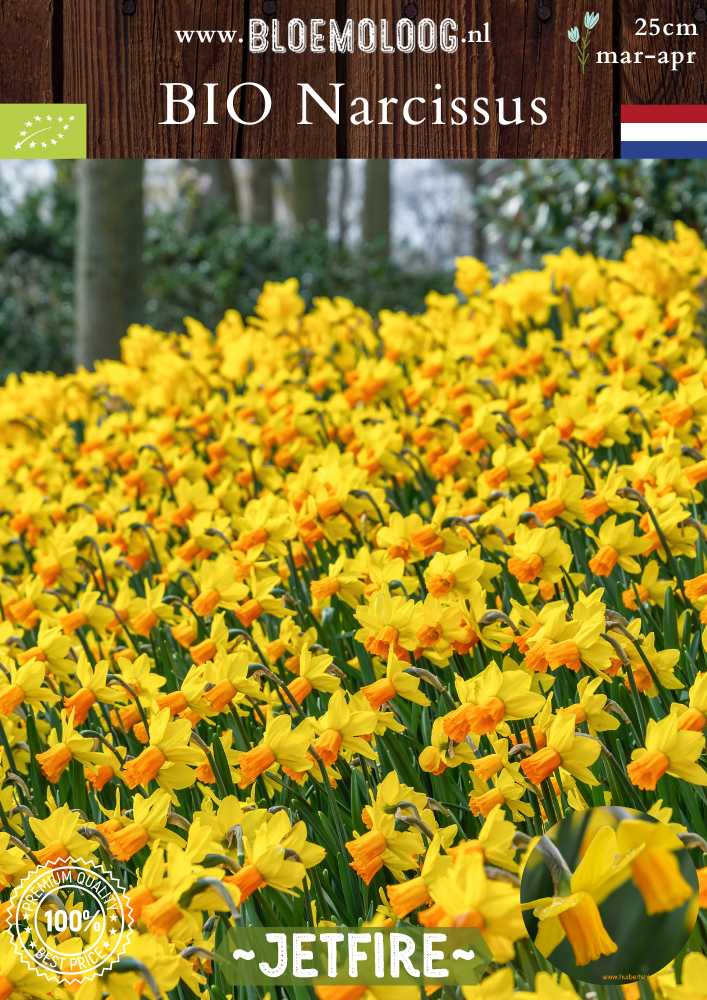Bloemoloog
Estimated Shipping Widget will be displayed here!
Couldn't load pickup availability
Organic golden yellow trumpet daffodil
The flowers of Narcissus 'Jetfire' have a trumpet shape with a strikingly long, slender crown and recurved perianths. The petals are bright yellow, while the trumpet-shaped corolla has a deep orange color, which provides a strong contrast and a striking appearance. The flowers are medium sized, with a diameter of about 5 cm. Each stem bears one flower, but the flowers are very bright and clearly visible and a flower bulb produces multiple flower stems.
Narcissus 'Jetfire' reaches a height of about 20 to 30 cm and blooms early in spring, usually in March and April, depending on climatic conditions. The leaves are narrow, grass-like and green in color. It is ideal for use in mixed borders, rock gardens and pots. It can be combined well with other spring flowering bulbous plants such as tulips, crocuses and hyacinths, as well as with perennials that bloom later in the season.
How, where and when do I plant daffodil bulbs?
An organic daffodil flower bulb needs a cold period, so plant it in the ground from September to January. The planting depth is 2 to 3 times the height of the flower bulb itself and the planting distance is 2 to 3 times the width of the flower bulb itself. When planting in pots, the flower bulbs may be planted closer together and may extend half above the ground for a decorative effect. However, after flowering, the flower bulbs should be planted back in the garden, while maintaining the planting depth and spacing discussed.
Plant the daffodil 'Jetfire' in a sunny to semi-shaded spot in the garden, pot or lawn. Plant the flower bulbs in groups in a nutrient-rich, water-permeable, preferably calcareous, sandy soil, but will also grow in clay soil. As long as the soil is well-drained and does not retain excess water. If you have clay soil, you can improve the soil by adding organic matter such as compost or well-rotted manure to improve drainage.
Daffodil bulbs are poisonous and are therefore avoided by rodents such as voles. Use them to protect other flower bulbs by planting them through and around them.
Care
Provide organic nutrition during planting. Cut off the spent flowers at the top and let the rest of the foliage die. Only cut it off when the leaf has completely dried out. The daffodil 'Jetfire' is a strong species that naturalizes well. She comes back every year faithfully. Provide organic food annually for optimal results.
Propagation
For propagation, the flower bulb can be dug out at the beginning of summer. The flower bulb is dried and stored in a warm place. They can be planted again from September. Plant the small bulbs separately and provide organic nutrition so that the small flower bulbs grow quickly.
Origin and history
The daffodil is an ancient genus. They originate from southwestern Europe but are currently found in many parts of the world.
Buy Organic Narcissus 'Jetfire'
Skal NL-BIO-01 certified: 109459
Packed per 10 flower bulbs or choose a stacking discount!
Stacking discount: E
Can be ordered from June '25!
EU shipping €8.95 - Free shipping from €100 purchase.
Characteristics
| Flowering time: | March - April |
| Planting time: |
From September |
| Planting depth: |
10 cm deep |
| Planting distance: | 10 cm apart |
| Height: |
25 cm high |
| Flower diameter: |
7cm wide |
| Location: |
Partial shade, sun |
| Soil PH: | Clay, loam, sandy soil - Slightly acidic/neutral |
| Winter hardiness: |
Good winter hardy |
| Propagation: | Good (naturalizes) |
| Origin: | Western Europe |
| Family: | Amaryllidaceae (daffodil family) |
| Colour: | Yellow |
| Bee-friendly: | Yes |
| Fragrant: | Yes |
| Bulb size: | 10/12 |
Other daffodil varieties

NL-BIO-01
To share






